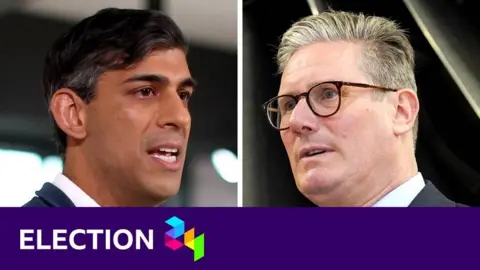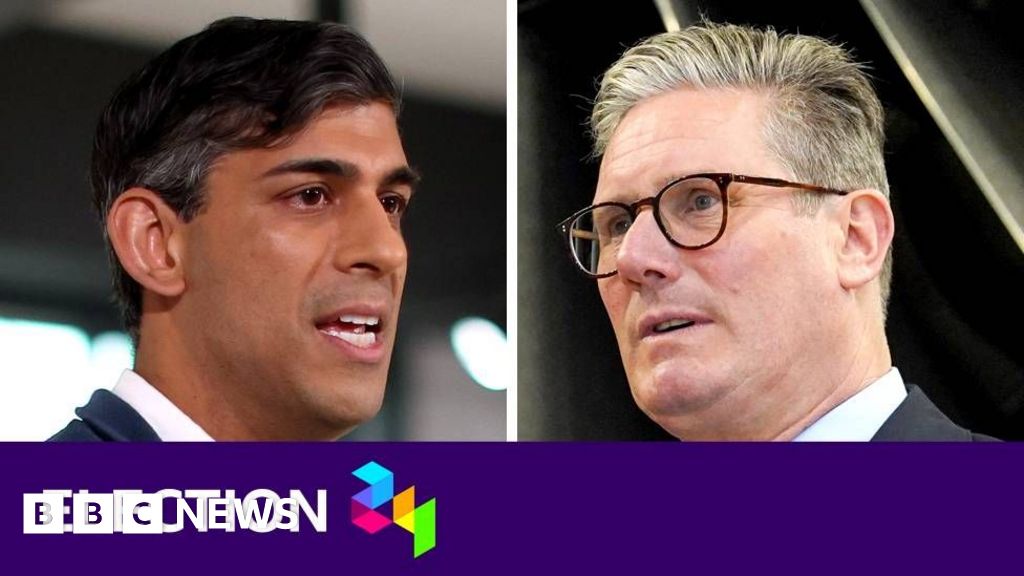Getty ImagesLabour and the Conservatives have been challenged over how they would fund their election pledges, ahead of their manifestos being launche
 Getty Images
Getty ImagesLabour and the Conservatives have been challenged over how they would fund their election pledges, ahead of their manifestos being launched next week.
The independent Institute for Fiscal Studies has warned the next government would have to cut the scope of what the state provides or increase taxes to maintain levels of departmental spending.
Both parties have said they will not raise the rate of income tax, National Insurance or VAT.
On the campaign trail on Sunday, Labour announced plans to build more prisons, while the Tories focused on welfare reform and the Liberal Democrats on support for carers.
Speaking on a visit to Essex, Labour leader Sir Keir Starmer refused to rule out spending cuts to public services but said his party would “not be raising taxes on working people”.
“All of our plans are fully funded and fully costed and none of them require tax rises over and above the ones that we’ve already announced,” he said.
Labour has already said it would end tax breaks for private schools which exempt them from VAT and close the loopholes allowing some people with non-dom status to avoid paying tax in the UK if it wins power.
It has also promised a time-limited windfall tax on the excess profits of oil and gas companies.
Asked if he could rule out spending cuts, Sir Keir said: “We are not returning to austerity. We will grow our economy.”
However, the Scottish National Party challenged Sir Keir to “finally start being straight with the public and explain where the Labour axe will fall on public services”.
The party said £18bn of public service cuts were coming down the line “because of the decisions made by both the Conservatives and Sir Keir Starmer’s Labour Party”.

Meanwhile, Reform UK has said it would save £50bn a year by cutting “wasteful spending” and bureaucracy.
Asked which public services his party would get rid of, leader Nigel Farage told the BBC: “It’s not about getting rid of public services, it’s about making them more efficient.
“It’s about the National Health Service not swallowing up huge amounts of money in diversity training, and things like this.”
He called for an “open debate” about the future of the health service, arguing “the NHS is not working the way it was 20 years ago”, despite taking up a higher percentage of government spending.
He added that a “mass simplification of the tax system” would “bring us enormous savings”.
Reform has said it would increase the threshold when people start paying tax to £20,000 a year, as well as abolishing inheritance tax for all estates worth less than £2m.
On Sunday, Labour set out plans to build more prisons in England by allowing ministers to bypass the traditional planning process.
However, shadow justice secretary Shabana Mahmood declined to rule out continuing a scheme that allows some prisoners to be freed early to deal with overcrowding, despite Sir Keir criticising it.
Ms Mahmood said it would be “irresponsible” to make a decision on the future of the scheme without seeing figures on how many offenders had been released.
Elsewhere, the Tories pledged almost £730m to expand NHS mental health treatment in England as part of moves to cut rising welfare costs.
It comes as the parties prepare to launch their manifestos next week, setting out what they plan to do if they form the next government.
The Tory manifesto is expected to include a promise to permanently get rid of stamp duty tax for first-time buyers of properties costing up to £425,000.
It is also expected to reiterate a previous commitment to scrap National Insurance when it is affordable to do so but it is not thought to include any pledge on inheritance tax.
Sir Keir has said Labour will have “no tax surprises” in its manifesto, suggesting it will stick to previous pledges not to increase income tax, National Insurance or VAT, as well as the tax changes it has already announced.
He has also confirmed the manifesto will include a commitment to recognise a Palestinian state as “part of the process” to a two-state solution, alongside “a safe and secure Israel”.
It will also include plans to recruit more teachers and police officers, and to cut net migration – the difference between the number of people coming to live in the UK and those leaving.
The Liberal Democrats have said their manifesto “will prioritise fixing the health and social care crisis”.
On Sunday, the party announced it would include a pledge to increase the Carer’s Allowance, available to people who look after someone with an illness or disability for at least 35 hours a week, by £20 a week.
The Lib Dems said they would also raise the eligibility threshold for the allowance to those earning less than £183 a week, with the changes costing a total of £1.4bn a year.
The Green Party says its manifesto will include practical solutions to the cost-of-living crisis, building new affordable homes, protecting the NHS from “creeping privatisation and cleaning up rivers and seas.
It has called for the next government to invest an extra £50bn a year in the NHS in England, funded through a new wealth tax on the top 1% of earners.
The SNP manifesto, which will be launched the following week, is likely to include a pledge to demand immediate negotiations with the UK government for another independence referendum if the party wins a majority of seats in Scotland.
www.bbc.com

